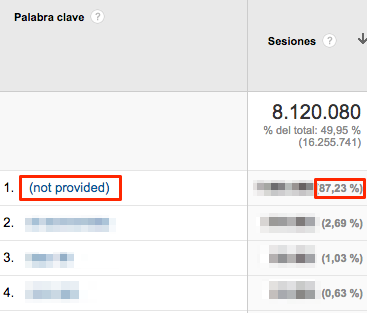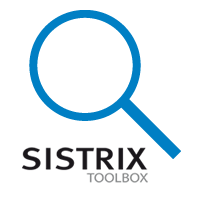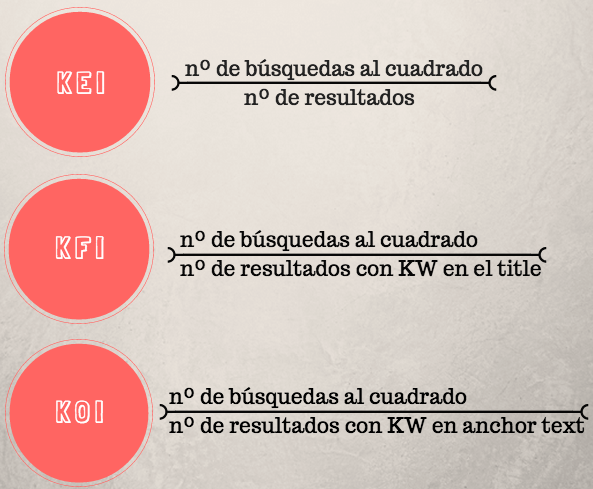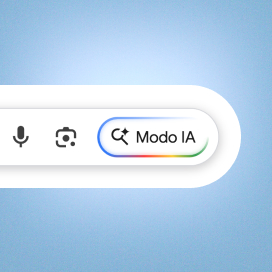Written by Fani Sánchez
Index
Every search engine positioning strategy begins with the definition and choice of keywords. These represent the concepts with which we want our customers to identify us and the terms with which we want Google to classify us. Therefore, it is of vital importance that we choose them very carefully: a wrong choice would make us focus our efforts on keywords that will not bring us the desired profitability.
As defined by Fernando Maciá in his book Posicionamiento en buscadores:
Keywords are a word or a combination of words with which search engine algorithms classify our web page and place it in a series of categories within their database.
In this article we are going to look at a very small part of the keyword consulting process in a search engine optimization campaign: the main tools.
Google Analytics?

Google Analytics was a reliable and valuable source of information prior to the entry into force of the (not provided). This is the concept under which the search formulas used by users logged into their Google account are grouped, from Firefox (from version 14 onwards), in the Chrome search bar or in the Google Onmibar in any browser.
As you can see in the screenshot above, the amount of organic traffic of which we do not know the formula of its keywords is huge in most websites and is expected to reach 100% sooner or later. Therefore, the keywords found in Analytics > Acquisition > All traffic > Channels > Organic Search will not be sufficient or representative. Although there are ways to deal with the not provided we recommend however to look at the organic landing pages on which our audience has landed(Behavior > Site content > Landing pages). It may give us a clue as to what content they were looking for.
The period chosen for data extraction will be at least the last year, which will ensure that we have sufficient data and contemplate the possible seasonality in our traffic and terms.
Google Instant Search
This Google functionality will act primarily as an idea-suggesting tool. Google introduced it in 2010 and it consists of the appearance of other predictive searches as we enter our search in the search engine or the Chrome address bar.
The options that Google Instant offers us as we type are based on predictive search suggestions and autocomplete. As you type your query, Google analyzes about 200 indicators to decide which pages and content make up the most relevant answer. For example, the originality of the content and words on the website, results recommended by people you have a connection with, the URL and title of the web page or synonyms of your search keywords.
Google AdWords keyword planner
The Google AdWords Keyword Planner is the tool that queries registered searches from the Google database. Since searches in this search engine represent approximately 95% of the total, it is clear that this is a tool that offers valuable data.
This tool has two fundamental strengths:
- Keyword Suggestor: suggests keyword ideas based on your entered terms. They are grouped into thematic or general concepts.
- Traffic volume estimation and historical statistics: it makes an estimation of the traffic volume through the registered searches. These records also have a history, so you can find out the annual search trend of certain words to identify cycles, patterns of behavior, seasonality, etc.
Before launching our keyword list, we will be careful to select the appropriate geographic and language segmentation, taking into account our business model and target audience. For example:
- If we are an e-commerce with a portal in Spanish, but we only send our products within the national territory, we will choose the segmentation in “Spanish” for “Spain”.
- If we are a Spanish-language newspaper and our business model is based on monetization by page impressions, we do not care where the traffic comes from, so in the segmentation we will only choose the “Spain” language.
We will enter the list of keywords for which we would like to position ourselves and we will obtain a list with their traffic and competition, as well as ideas of terms that could be useful.
Übersuggest

Tools for sites with historical data
There are other types of very, very useful keyword consulting tools, as long as your website already has a positioning history, that is, we are not talking about a new site. These tools collect positioning data and will show you, among other things, for which keywords you are already positioned.
SEMRush
SEMRush is one of the most popular and established tools among SEOs. SEMRush’s strengths in keyword consulting are:
- Analysis of keywords and domains positioned for them
- Competitor study
Entering our domain name (or specific page, but not directory) in the search box and selecting the corresponding country for our search will list, among much other information, the organic keyword report. You can access it either from the Top Keywords module or from the Organic side menu > Positions.
This list shows a list of keywords for which we rank in the Top20 for organic results in Google.. We must consider in our list those words for which our site is already well positioned, because with great probability, it will be worth keeping them in our list and promote them in their corresponding pages. We should also consider those words for which we are positioned on the second page because if they have good potential and fit with our business objectives, we can see with which URL we appear positioned and analyze it in detail: does it have the right keyword density, is the text relevant enough, how are the internal links to this page distributed and with what anchor text? In short, how can we improve this page to improve its positioning?
Competitive research with SEMRush
In this last respect, SEMRush will help us analyze the positioning of our competitors. Do the same exercise with a competing website and analyze its keywords. Extract term ideas, analyze the pages that rank for the target terms you are looking for and compare them with your pages. Use the section Instruments > Domain vs. Domain in the side menu. You will be able to compare your positioning with that of up to 4 other domains. ¿What words do you have in common? Which of the words you would like to rank for do your competitors rank for but you don’t? This section is a great source of ideas.
If you are curious, you will be interested to read this article about competition research with SEMRush.
SISTRIX

In addition, in the side menu you will find the Keyword Ideas section. It details a list of keywords based on current rankings, this list will give you ideas for keywords that use similar search queries that Google lists at the bottom of the search results.
The strength of this tool is that it allows you to monitor the positioning of a keyword over time and you can analyze directories, not only pages and domains. You can also compare the visibility of several domains.
KEI, KFI or KOI: reliable indicators?

- For quite some time, Google has been rejecting the over-optimization of links (mainly the appearance of keywords in the anchor text), which has caused this trend to become obsolete. So, do indicators that use this variable make sense?
- In many cases, titles are manipulated by Google: they are shortened or particles are added depending on the user’s search, the length of the title, the repetition of words and other factors. Therefore, what data is this indicator picking up? The real title or the manipulated one?
As you can see, the values provided by these formulas can serve as reference data, always taken with a pinch of salt, but little more. Do not base your keyword consulting strategy on these indicators.
If your website is “virgin”
If your website does not have historical data because it is new or very recent, these tools can also do a reverse analysis. That is, list a list of domains for which a keyword is positioned, without entering it in the box. From this analysis you can extract a lot of information. You can also enter competitor domains and analyze their situation. Remember that when determining who your competition is, it’s good to be ambitious but also realistic. Set achievable goals.
Contextualize
As I mentioned at the beginning of the article, this one is focused on some of the preferred tools for keyword consulting. We have not delved into the previous aspects to be taken into account (disambiguation, jargon, idiomatic context, anticipatory searches, branded concepts, user profiles…) nor in the use of these tools, but I encourage you to use them if you are interested in the article.
If you want a more comprehensive and global training on the keyword consulting process and many other tools, Human Level Training has a course waiting for you.
As you can see, this has only been a superficial review of the preferred tools in Human Level and that every SEO should know, but there are plenty of them and each master has his own book. The important thing is to always take the data in context and with a certain relativity. There are certain patterns and keys to properly choose our list of keywords from among the options offered by these tools, but there are no magic formulas and we must always be clear that correcting this list throughout the campaign is only a sign that we are carefully monitoring what works and what does not work in our project.






